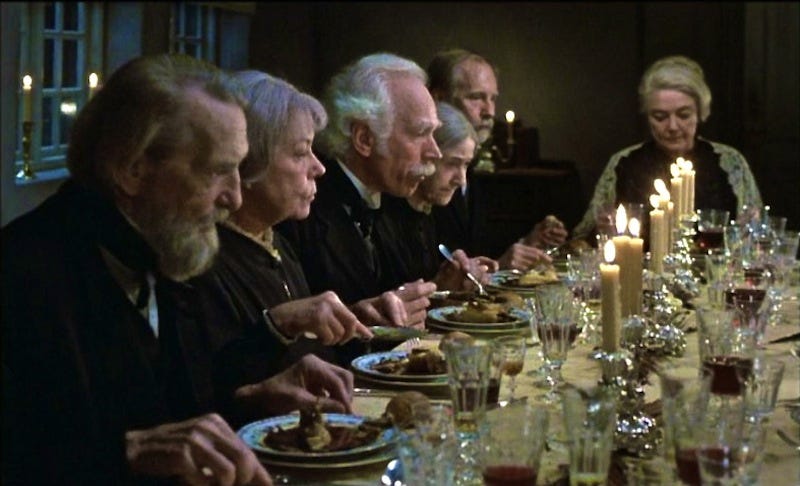
Robert Capon once wrote that “Grace is the celebration of life, relentlessly hounding all the non-celebrants in the world.” Babette’s Feast is Robert Capon on screen. It is a delicious blend of humor and smells; sights and music. It is virtually impossible to contemplate the movie without considering its vastly religious and sacramental implications.
The 1987 movie is based on a short story by Isak Dinesen. The characters–two elderly maiden sisters–Martine and Philippa, continue the work of their deceased father, who was a prophet/pastor figure of a small Christian sect. After the death of their father, the two sisters immerse themselves in a life of charity while carrying their father’s work to a decreasing and dying number of followers. The two beautiful young women never married. Their father’s vision kept them from pursuing “worldly concerns.”
The entrance of two men into their lives offer a bit of adventure. Wendy McWright summarizes well the entrance and exit of the two characters:
First, Lorenz Lowenhielm, a dissolute young cadet, in summer exile at his aunt’s Jutland home as a result of parental punishment for unbecoming behavior, is captivated by Martine’s beauty, has an idealistic vision of a higher, purer life and wins an introduction to the pious circle where he hopes to make her acquaintance. But he soon finds himself at a loss in the rarified atmosphere and leaves, claiming that some things are impossible. The “world,” he announces, will be his heritage and he vows to achieve all worldly success, a feat which he duly accomplishes. Next, Achille Papin, a famous opera singer, finds himself on the remote coastland in search of rest. The solitude plunges him into a bleak mood which is relieved only upon hearing Philippa’s voice raised in angelic hymnody. Believing that her voice is destined to thrill the heart of Europe, Papin offers himself as vocal tutor and educates his pupil in the operatic repertoire. The frank sensuality of the musical lyrics soon convinces his pupil that she must terminate the lessons and Papin returns to the continent without her.
Years later, during the French Civil War, Papin sends them Babette. Babette has lost both husband and son and is now seeking refuge from war in the small island.
Babette’s work ethic and great culinary gifts bring a certain happiness and economic stability to the sisters. Babette’s role in the small community–especially among the few devout–is that of a peace-bringer. The remaining disciples cease to seek peace and the quarrels increase. Babette brings shalom to the community as she embraces a spirit-figure restoring and putting broken pieces together.
In order to reconcile and restore peace to the saints, the two sisters decide to offer a meal in celebration of her father’s one-hundredth birthday ( had he been alive). As the date draws near, Babette receives news that she has won 10,000 francs in the French lottery. The sisters are certain that Babette will now return to France and live off her new prize. Instead, Babette decides to use her lottery wins to prepare a feast of a lifetime for the hundredth birthday celebration.
Babette, the culinary artist, goes to France and returns with all the ingredients (living and dead). Unaware of the strange ingredients to the feast–turtles, live quail, and wine–the sisters and the disciples decide to make a vow that they will lose their sense of taste and smell during the feast.
As the guests pour in and as each course is served and each glass filled, the vow becomes harder and harder to fulfill. Each bite and each sip bring them new life and vitality, which begins to undo the bitterness and restore the small community. The quarrels are turned into joy and the memories are turned into frameable moments in their history.
The movie ends with a heavenly picture of the saints singing around a well. The well, the very biblical image of wars and wedding bells, become the symbol of joy and restoration, sins forgiven and relationships healed.
Babette’s Feast provides an image of the holy. The holy is not other-worldly, it is the entrance of the heavenly into the world. The feast becomes a celebration of life. Bread and wine are not merely earthly nourishment, but the relentless call of grace to those who are afar off. Come and taste the feast.
The post Babette’s Feast: A Movie Review appeared first on Resurrectio et Vita.

